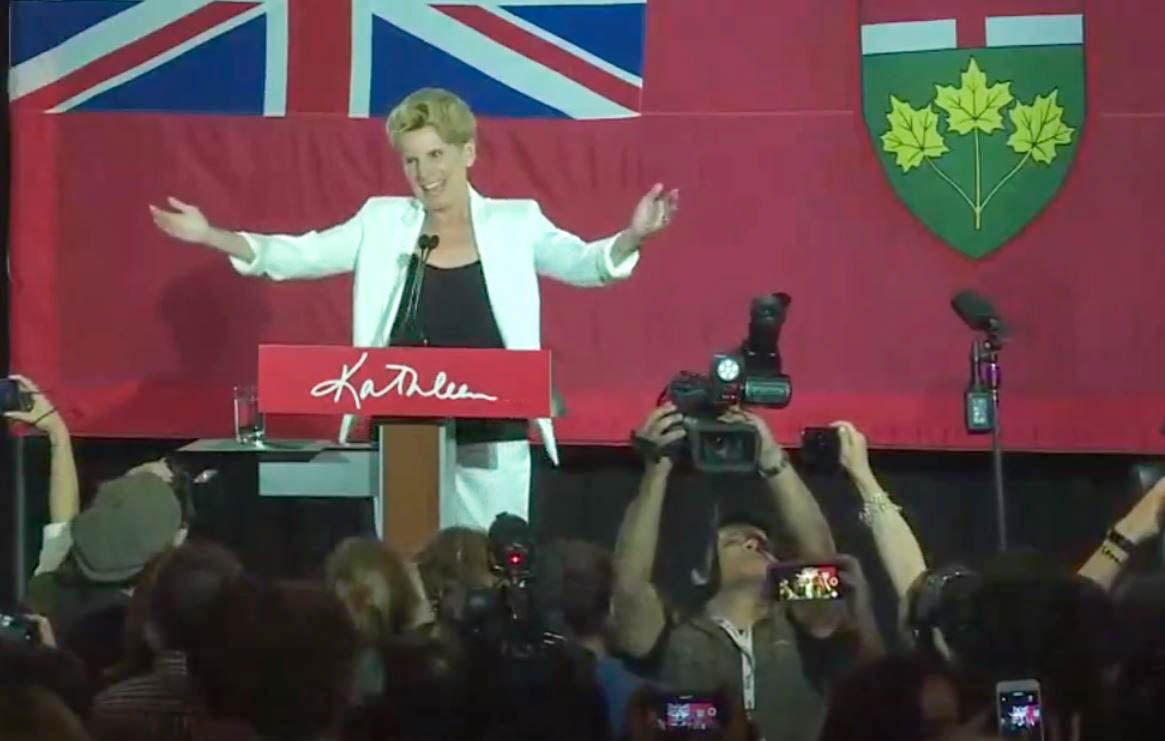Rare is the campaign where a politician concedes before election day. Kathleen Wynne threw in the towel days before Ontario voters delivered a verdict on her government at the ballot box on Thursday.
The outcome was as she feared. The governing Liberals were routed, losing dozens of seats and suffering the party’s worst defeat since George Brown brought together Reformers and Clear Grits a decade before Confederation.
Among the Liberals steamrolled by the electorate was Jim Bradley, whose streak of consecutive election victories was ended at 11. He first won election to represent St. Catharines in 1977, when NDP leader Andrea Horwath was age 14 and Progressive Conservative leader and now premier-designate Doug Ford was just 12.
The Liberals claimed only seven seats, one short of qualifying for party status at Queen’s Park. Without status, the Liberals will be recognized less by the Speaker during Question Period and they will not have public funds for caucus offices or for research and organization. (In Ottawa, the threshold is 12 seats out of 338 members of Parliament; in B.C., two MLAs of 87.)
The Liberal drubbing was historic, but it was far from the worst in Canadian history. Here are some other thrashings administered by voters on a governing party:
British Columbia (2001)
Bingogate. Fast ferries. Glen Clark’s deck. The NDP had won a majority government with less than a plurality of the popular vote in 1996. After five years of strife and resignations and a contentious leadership convention, the NDP under Ujjal Dosanjh was not so much renewed as exhausted. Voters had long since tired of the shenanigans. Gordon Campbell’s B.C. Liberals won 77 of 79 seats, while the NDP was reduced to just two MLAs — Jenny Kwan and Joy MacPhail. Sixteen years would pass before a New Democrat once again occupied the premier’s office.
British Columbia (1933)
Simon Fraser Tolmie, a farmer and veterinarian, served as the Dominion’s chief inspector of livestock. He was elected to the House of Commons and served as federal agricultural minister. He quit to lead the B.C. Conservatives to victory in the 1926 election. A lacklustre government was incapable of responding to the ravages of the Depression. Meanwhile, by 1933, internal squabbles caused the party to collapse. Each constituency operated on its own. Those who backed Tolmie ran under the Unionist ticket, while those who supported his rival, former premier William John Bowser, ran as the Non-Partisan Independent Group. Bowser died during the campaign and several candidates withdrew. Duff Pattullo won a majority for the Liberals with 34 seats, while the pro-labour Co-operative Commonwealth Federation (CCF), a precursor of the NDP, formed the Official Opposition with seven. A lone Unionist won election.
Alberta (1935)
The United Farmers of Alberta had formed government for 14 years and were known for fiscal prudence and sober if cautious governance until a sex scandal forced John Brownlee from office. (The married premier was accused of seducing an 18-year-old family friend, who sued him. A sensational trial ended Brownlee’s political career.) R.G. (Dick) Reid, a Scottish-born Boer War veteran, succeeded Brownlee as premier. He was sympathetic to the travails of farmers during the Depression, but had few policies to ease the suffering. The fledgling Social Credit party under the charismatic evangelical minister Bible Bill Aberhart promised Prosperity Certificates, a scheme derided by opponents as “funny money.” Social Credit won 56 of 63 seats and a hold on government that would last 36 years despite the certificates proving to be a bust. The United Farmers were wiped out, failing to win a single seat. After the defeat, they abandoned electoral politics, and, in time, the United Farmers of Alberta Co-operative became a strong, farmer-owned enterprise that is still active today.
Reid finished third in his constituency of Vermillon, finishing just 38 votes ahead of the Communist candidate. He lived another 45 years before dying in obscurity in 1980 at age 101.
New Brunswick (1987)
Richard Hatfield had been premier for 17 years when he sought a fifth mandate in 1987. By then, he had survived a caucus revolt following byelection losses. He had also been charged and acquitted of marijuana possession after Mounties found a stash in his bags during a visit by the Queen. Rumours of excess partying earned him the nickname Disco Dick. Liberal leader Frank McKenna was widely expected to win. He took 60 per cent of the vote to Hatfield’s 29 per cent. The Conservatives were wiped out, losing 38 seats as the Liberals claimed all 58 in only the second clean sweep in Canadian history. (In 1935, Walter Lea won all 30 seats for the Liberals in the Prince Edward Island election.) McKenna named a fellow Liberal, Camille Thériault, as Opposition leader.
Canada (1993)
Fatigue after nine years of majority Progressive Conservative rule under Brian Mulroney left newly minted prime minister Kim Campbell of Vancouver with the unenviable task of renewing her party’s fortunes. After a hapless campaign, the Tories took 16 per cent of the vote, winning just two seats (Elsie Wayne in New Brunswick and Jean Charest in Quebec). Jean Chretien became prime minister for the Liberals with the separatist Bloc Quebecois under Lucien Bouchard as Official Opposition. Preston Manning’s populist, right-wing Reform Party went from one seat to 52 to finish just two behind the Bloc. The Progressive Conservatives never recovered and were eventually absorbed by their Reform rivals, who abandoned Red Tory policies but kept half the venerable brand name (dropping Progressive) under which they campaign today.
Saskatchewan (1944)
It had been six long years since Saskatchewan had been to the polls, as an unpopular Liberal government cited a wartime emergency to delay a reckoning. Baptist preacher T.C. (Tommy) Douglas, a riveting radio orator, led the Co-operative Commonwealth Federation and campaigned for social democratic reforms. William John Patterson, the Liberal premier, called Douglas a Communist, while the Regina Leader-Post warned the CCF would impose a “stultifying dictatorial system.” The voters didn’t believe a word of it, giving Douglas and the CCF 53 per cent of the vote and 47 of 52 seats to form the first socialist government in North America. The CCF would hold government in the province for 20 years, bringing socialized medicine to the province and, eventually, the country. ![]()
Read more: Politics
















Tyee Commenting Guidelines
Comments that violate guidelines risk being deleted, and violations may result in a temporary or permanent user ban. Maintain the spirit of good conversation to stay in the discussion.
*Please note The Tyee is not a forum for spreading misinformation about COVID-19, denying its existence or minimizing its risk to public health.
Do:
Do not: